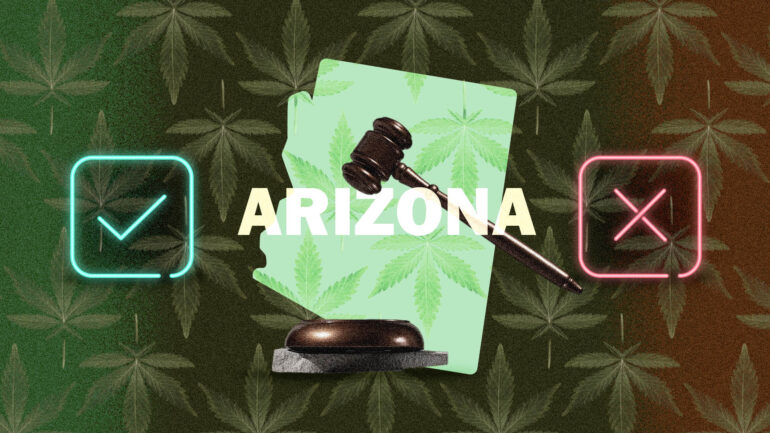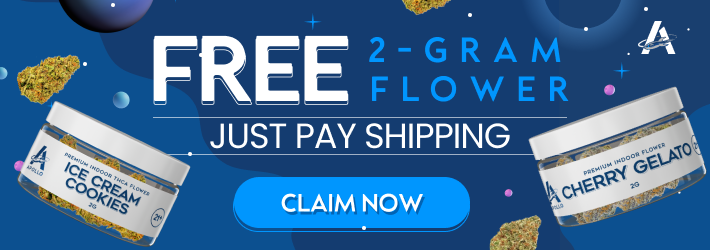Key Takeaways
- Recreational and medical marijuana: Arizona legalized recreational marijuana in November 2020, allowing adults 21+ to possess up to 1 ounce (including 5 grams of concentrate). Medical marijuana has been legal since 2010, with patients allowed up to 2.5 ounces every 14 days.
- Restrictions and penalties: Smoking in public is prohibited, and possession over legal limits incurs penalties, ranging from fines for small amounts to felony charges for larger quantities. Driving under the influence is illegal with severe penalties for multiple offenses.
- Cultivation and Delta-8 THC: Adults can grow up to six plants per person (maximum 12 per household) in secure, non-visible areas. Delta-8 THC is illegal despite the legalization of delta-9 THC, due to specific state definitions and legal interpretations.
Arizona legalized recreational weed in November 2020, allowing adults aged 21 or over to possess up to one ounce of marijuana (including a maximum of five grams of concentrate) legally.
The state also has a medical marijuana program, so you can also get weed on a purely medical basis with looser limits on quantity (up to two and a half ounces).
However, you can’t smoke in public and there are still penalties if you have large amounts, so it’s worth getting up-to-date on Arizona weed law.
Is Marijuana Legal in Arizona?
Weed is legal in Arizona following the passage of Proposition 207.
Adults aged 21 and over can possess up to 1 ounce of cannabis (including 5 grams of concentrate).
Is Recreational Marijuana Legal in Arizona?
Proposition 207, also known as the Safe and Smart Act, is essentially the Arizona weed legalization bill.
This law makes it completely legal for adults aged 21 and over to possess and buy up to an ounce of marijuana, and also includes up to five grams of concentrate.
You can buy marijuana from licensed marijuana dispensaries across the state, and you’re also allowed to cultivate.
Penalties for Possession of More Than an Ounce
While the Safe and Smart Act legalized possessing up to an ounce of marijuana, there are still penalties if you have more than this.
- For less than 2.5 ounces (with no more than 12.5 g of concentrate), possession is considered a petty offense and carries a fine of up to $300.
- For amounts beyond this and up to 2 pounds, possession is a class 6 felony, punishable by 6 months to 1.5 years in jail and a minimum fine of $1,000.
- Possession of over 2 pounds but less than 4 pounds of marijuana is a class 5 felony, carrying a jail sentence of between 9 months and 2 years, and a minimum fine of $1,000.
- If you have more than 4 pounds, this is considered a class 4 felony, with a jail sentence of between 1.5 and 3 years, with a minimum fine of $1,000.
- For all of the felony violations, anyone granted probation will serve a minimum of 24 hours of community service.
Is Medical Marijuana Legal in Arizona?
Yes, medical marijuana is legal in Arizona.
Proposition 203, the Arizona Medical Marijuana Initiative, passed in 2010 (by a razor-thin margin), was signed into law in 2011 and established the medical marijuana program in Arizona.
Patient Possession Limits
Patients can possess up to two and a half ounces of usable marijuana in a 14-day period.
Home cultivation of up to 12 plants is allowed if you live further than 25 miles from a state-licensed dispensary.
How to Get a Medical Marijuana Card in Arizona?
Getting a medical marijuana card in Arizona works a lot like it does in other states.
To start, you have to be aged 18 or over (or have a legal guardian registered as a caregiver), have an Arizona address, and have a driving license or state identification card.
Then, you have to have one or more of the following qualifying conditions:
- Cancer
- Glaucoma
- Human immunodeficiency virus (HIV) / acquired immune deficiency syndrome (AIDS)
- Hepatitis C
- Amyotrophic lateral sclerosis
- Crohn’s disease
- Agitation of Alzheimer’s disease
- A chronic or debilitating disease or medical condition or its treatment that produces one or more of the following:
- Cachexia or wasting syndrome.
- Severe and chronic pain.
- Severe nausea.
- Seizures, including those characteristic of epilepsy.
- Severe and persistent muscle spasms, including those characteristic of multiple sclerosis
Then, you need to find a doctor who can approve patients for a medical marijuana card and schedule an appointment. If the doctor agrees with or confirms your diagnosis and approves you for a medical marijuana card, they will either send the documents to the Department of Health Services for you or will give you a Physician Certification Form.
If you just get the form, you’ll have to make your own application on the Department of Health Services website. If your physician submits the application for you, you can expect your Arizona medical marijuana card in the mail within 10 business days. If you submit yourself, you’ll receive an email with a digital version of the card.
Can You Consume in Public in Arizona?
Smoking marijuana in a public place or open space is a petty offense.
This means it’s punishable by a maximum fine of $300, but no jail time. This is true whether you’re a recreational or medical user, so the basic rule is that you can’t consume in public at all.
Can You Drive Under the Influence of Weed in Arizona?
Driving under the influence of marijuana is still illegal in Arizona.
The state also has an implied consent law, meaning that by operating a vehicle in the state, you’ve already given consent to blood, breath, urine, or other tests for alcohol and drug use.
Refusal can lead to a 12-month license suspension, and your refusal will be admissible as evidence in any legal proceedings.
For the DUI itself, punishment depends on the number of DUI offenses you have to your name:
- For a first offense, the punishment is between 10 and 180 days of jail time, attending an alcohol and/or drug rehab program, a fine of approximately $1,800, up to five years probation, community service, and an ignition interlock device for 12 months. You may also have to attend one or more Victims Impact Panel sessions from Mothers Against Drunk Driving.
- For a second offense (within 7 years), the jail term is 90 to 180 days, fines of approximately $3,500, license revocation for one year, evaluation for substance abuse problems, up to five years probation, a minimum of 30 hours community service, and possibly having to attend one or more of the Mothers Against Drunk Driving sessions.
- For a third offense (within 7 years), it’s considered a class 4 aggravated felony, which carries a minimum of four months jail time, the possibility of vehicle seizure, up to $150,000 in fines (plus an 80% surcharge), license revocation for three years and probation for up to five years.
- If you have a child aged under 15 in the vehicle with you, regardless of the number of past offenses, it’s a class 6 felony/aggravated DUI, carrying up to $150,000 in fines (plus the same 80% surcharge), probation for up to five years and license revocation for three years.
Is Delta-8 THC Legal in Arizona?
Delta-8 THC is not legal in Arizona.
Despite the state having legalized marijuana, a March 2024 opinion from Attorney General Kris Mayes makes the argument that delta-8 is not included in the state’s definition of hemp.
According to the Attorney General, delta-8 is considered cannabis in the state, and in any case the law for hemp products states, “Hemp products excludes any product made to be ingested except food made from sterile hemp seed or hemp seed oil.” This means delta-8 THC products cannot be sold as hemp in the state.
Additionally, despite having legal weed, ‘the way in which it’s written into the state’s controlled substances act is specific to delta-9:
“Cannabis, except the synthetic isomer of delta‑ 9‑ tetraydrocannabinol.”
This means that cannabis is still a Schedule I controlled substance, but an exception has been made in the case of standard, delta-9 weed.
While the legal situation for delta-8 is still a little unclear – since it would be a bit strange to arrest someone for delta-8 outside a dispensary legally selling delta-9 – most readings suggest it’s illegal.
However, it’s unlikely that law enforcement is interested in users, only those selling it.
RELATED: Where Is Delta-8 THC Legal? A State-by-State Map
Is Weed Decriminalized in Arizona?
Weed is legal in Arizona up to 1 ounce, and the $300 fine for possessing up to 2.5 ounces essentially amounts to decriminalization for larger amounts.
However, beyond this limit, punishments are a lot more like those of pre-legality.
Is Growing Weed Legal in Arizona?
The Safe and Smart Act also legalized growing weed in Arizona.
Adults aged 21 and over can grow up to six cannabis plants for personal use, as well as processing them using manual methods (like sieving and ice water separation) but not chemical (e.g. butane extraction).
If there are two or more adults in the home, there is a hard limit of 12 plants per household.
There are also a few guidelines about where you should grow. Generally speaking, you need an enclosed area with a lock (or something else to stop kids from getting to them) that isn’t in plain view of neighbors or the public. This is pretty common-sense stuff, so most home-growing operations will be legal in the state.
Conclusion
With legalized adult use of marijuana, a good medical program and sensible rules for things like home growing, adults in Arizona are pretty much free to use cannabis in the privacy of their own home however they like.
The only limitations come for things like smoking in public, driving, or possessing more than an ounce, and even then they’re generally pretty lax. The state’s apparent prohibition on delta-8 is a little strange, but with delta-9 being so accessible anyway, this won’t be a big deal for most.

